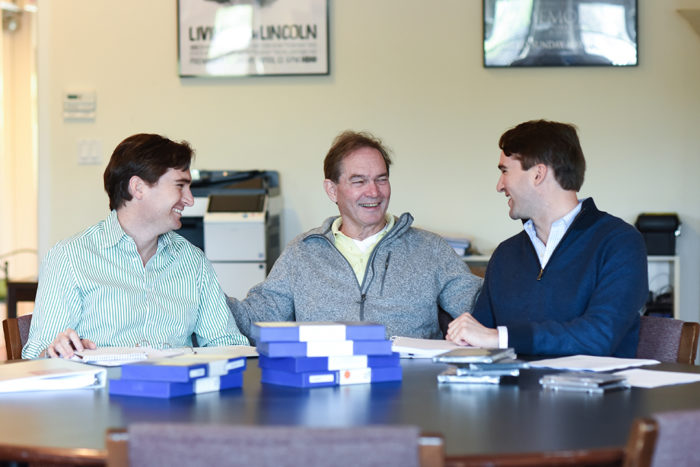
The Kunhardts Produce Documentaries That Shape Our World and Focus on Moral Leadership
For Peter Kunhardt, a six-time Emmy and a Peabody Award winner, collaboration with family is in his DNA. As Executive Producer and Director, Peter partners with two of his sons, Teddy and George, at Kunhardt Films to produce critically acclaimed and socially relevant documentaries about the people and ideas that shape our world.
After ten years as a producer at ABC News, Peter gave up the hectic commute to New York City and founded Kunhardt Productions in Westchester in 1987. His first film project for HBO, JFK: In His Own Words, was in collaboration with his father, Philip B. Kunhardt, Jr., the longtime managing editor of Life Magazine. He had watched the toll that forty years of commuting from Chappaqua took on his father. Peter and his wife Suzy were raising their family in Chappaqua and he wanted to work closer to home.
A Family Business at Heart
“It’s definitely a family business with multiple departments,” says Peter Jr. All the Kunhardt children interned with their father. Peter Jr. worked on two Lincoln books with his father and grandfather. He is now the Executive Director of the Meserve-Kunhardt Foundation and the Gordon Parks Foundation that preserves the work of photographer Gordon Parks and educates the next generation of scholars and students on his work.
Teddy and George joined their father at Kunhardt Films in 2009. George knew as a teen that filmmaking was his future. Teddy, an artist and chef, took a slight detour and ultimately joined his father’s company. Both brought their gifts and talents.
“My skill set and interests are the creative and the technical. I’m more of the people person, in the trenches on filming and working with my crew,” says George whom his father and brother call the “peacekeeper.” “He’s the best spokesman for the company,” says Teddy.
Teddy’s skill set is the business side: deals, the budgeting and more of the legal side, dealing with the lawyers. Their father Peter is overarching, and knows everything about everything says George. “He sits back and listens and chimes in when needed when he has something appropriate or important to say.”
“I listen hugely hard to both Teddy and George. Frankly, they are taking over more and more of what I used to do, and I continue listening,” says Peter. They agree 95% of the time, but Peter will have the last word when they disagree.
While their business office is in Pleasantville near the Jacob Burns Film Center and Metro-North, which were draws for this location, most of the team is in New York at HBO.
“We are fortunate to be partners with HBO. People would be surprised to learn how long it takes to produce a film, and HBO gives us the time we need,” says Teddy. “Pleasantville is the brains, the budgeting, the pre-development side of the projects, and the heavy lifting of producing,” says George. “The HBO team is young, creative, hip and where the exciting culture of filmmaking is done.”
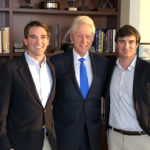
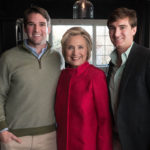
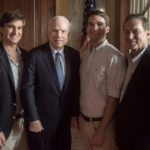
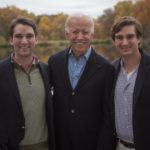
Exploring Moral Leadership Through Film
The notion of moral leadership is always their default in selecting subjects for their films. “Years ago, we said we wanted to explore this concept of moral leadership,” says Peter. “In this day and age of what we’re experiencing now it seems to be a more and more important thing to be doing to remind people what true leadership and true moral courage look like. Fortunately, we were a little ahead of ourselves picking an important kind of theme early on. That’s why it takes us so long to pick the people.”
“And sometimes you have to wait for the hook,” says Teddy. The hook for King in the Wilderness was the 50th anniversary of Martin Luther King Jr.’s death. He was on their list in 2009 but the film did not come into fruition until 2018. “We couldn’t have found a home ten years ago, but once the anniversary was approaching it all seemed right.”
Their very personal film in 2015, Living with Lincoln chronicles their six-generation struggle to preserve Abraham Lincoln’s image for more than a century. As a love letter to Peter’s grandmother Dorothy Meserve Kunhardt, it explores the emotional and physical connection to the president starting with William Meserve and his Civil War diary. Dorothy, a quirky Lincoln scholar, is best known as the author of the beloved interactive children’s book, Pat the Bunny. It was a glorious burden for the family. “I never planned to dedicate so much of my life to Lincoln, it just happened. I felt I owed it to my father, just as he owed it to his mother, just as she felt she owed it to her father,” says Peter.
Teddy and George enjoy working with their father. “We know each other’s strengths and weaknesses. Our communication is so strong that it has been the key to our success,” says George. One of the downsides though is that they talk about their work all the time, which is fun for them, but not so much for their wives.
“We get a lot more from people because we are a family business,” says George. “When we interviewed Joe Biden for John McCain: For Whom the Bell Tolls, we got a lot more access from him. He loved that Teddy and I were brothers. He took my cellphone and called my dad, and told him how much he enjoyed working with us.”
Trust is Key
“The biggest challenge we face is gaining trust,” says Peter. “Once you gain the trust of your subject you begin getting better access, content and stories.” When they filmed Becoming Warren Buffett, Buffett gave them strict restrictions in the beginning, only one interview, but they ended up filming him for fifteen hours. “Trust comes in a few ways: for one, they have to feel that we’re not out to give you a gotcha question. We’ve never been in that business, but we’re not in the business of a soft fluffy story either.”
Storytellers at the Core
They take a deep dive into the lives of their subjects. “We’re not historians, business people or news correspondents,” says Teddy. “We’re storytellers and in order to tell the story we need to get all the pieces of the puzzle.” They often look for people who have a relationship or don’t have a relationship with their parents and explore that in the film. “That’s a unique perspective to take because we’re very interested in lineage: Fathers/sons, fathers/daughters, mothers/sons, mothers/daughters,” says George. “That’s our wheelhouse. It is fun for us to do that within a film and something we look for when we do a project.”
“When you go back to someone’s childhood you learn about strengths and weaknesses and how they came to be in a way that would be hard to imagine by just focusing on the adult period of someone’s life and their success,” says Peter. “It’s fascinating to go back and see what influenced a child, what hurt a child, what helped a child. And how they were shaped by that.”
On the Horizon
Teddy and George have brought some fresh ideas to the film company. In addition to cable, there is now the film festival route. Jim: The James Foley Story premiered at Sundance and won the Audience Award, King in the Wilderness had its world premiere at Sundance and True Justice: Bryan Stevenson’s Fight For Equality will open the AFI DOCS film festival in June. George says that one of the best things that they are doing now is the establishment of the Kunhardt Film Foundation with its mission to put their high-quality educational programs, raw interviews and teaching tools into the hands of the public and schools. “This is our future where we are heading towards. We are doing more not-for-profit,” says Peter.
Their next film, True Justice: Bryan Stevenson’s Fight For Equality will have a screening at the Jacob Burns Film Center on June 25th, and debuts on HBO the following day.
Always reflecting as well as looking forward, they are proud of their high-quality work and very thoughtful filmmaking. “We are fortunate in that we can continue to infuse values into the work we do, and pick people to tell their stories that we think have lessons,” says Peter. George sums it up well: “We’re curating an interesting perspective of people and ideas that people need to be learn about. That is what I hope people enjoy about Kunhardt Films.”
